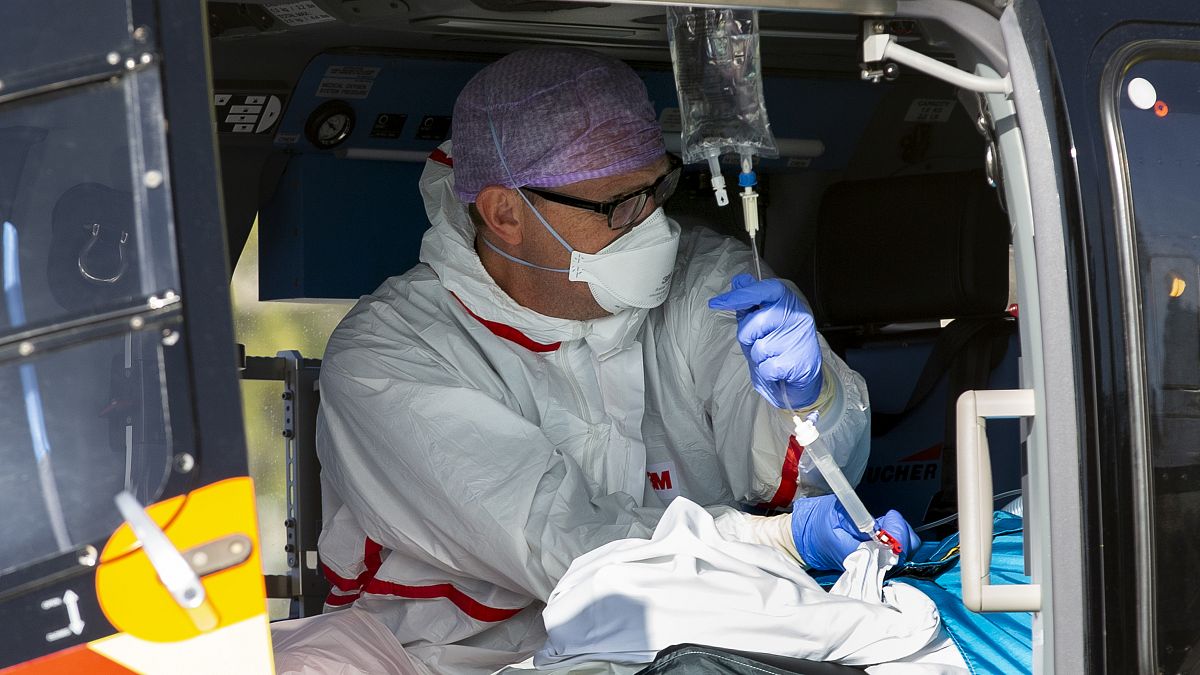Delta variant COVID cases have risen by 46% in a week in the UK, while experts estimate 90% of all Europe's coronavirus cases will be the Delta variety by the end of August.
The United Kingdom has recorded another 35,204 cases of the Delta variant of coronavirus in the past week - a 46% rise on the week prior.
This means the total number of Delta infections now stands at 111,157, according to British health authorities, which also note that it is by far the most dominant variant in the country. It accounts for more than 90% of all the UK's new cases.
In wider Europe, leaders have urged citizens to "remain vigilant" in the face of the highly-transmissible variant, with German Chancellor Angela Merkel warning on Thursday: "In Germany and Europe, we're also still moving on thin ice."
So what do I need to know about the Delta variant? And what's the talk about the Delta Plus?
What is the Delta variant?
This variant B.1.617.2 was first identified in India and is a variation of SARS-CoV-2, the virus that causes COVID-19 disease.
It has been named after a letter in the Greek alphabet, per guidance from the World Health Organisation (WHO) on naming variants of concern. Neutral names are thought to avoid stigma against previous namesakes related to where variants are first identified.
Why is this variant a concern to me?
While it is normal for viruses to mutate, these changes can sometimes alter the effects of the virus itself.
The Delta variant, for instance, is believed to include mutations that make it easier for the novel coronavirus to latch onto the cells in our bodies. This means the variant spreads more easily than the original - and therefore has greater potential to cause outbreaks.
It is not yet known whether the variant also makes people more sick; however, research is underway.
Is it more transmissible than the Alpha variant?
Yes. The Alpha variant, first identified in Kent, England, was also believed to be more transmissible than the original form of SARS-CoV-2.
However, the Delta variant has now overtaken this. It is believed to to be 60% more transmissible than Alpha.
How far has it spread in Europe?
Projections from the European Centre for Disease Prevention and Control (ECDC) show the Delta variant could account for 90% of all COVID-19 cases across the continent by the end of August - a similar picture to the current situation in Britain.
The Stockholm-based agency added that relaxation of COVID-19 restrictions in place "could lead to a fast and significant increase in daily cases in all age groups."
Lisbon
Portuguese officials say hospital admissions have reached a "worrying" level in Lisbon after a surge in virus cases caused by the Delta variant. While still manageable, Cabinet Minister Mariana Vieira da Silva told a press conference this week that the situation was "getting worse".
Are the symptoms the same?
There are signs of other symptoms outside the notorious dry cough and loss of taste and smell that develop with the Delta variant of coronavirus.
Professor Tim Spector, who runs the Zoe COVID symptom study in the UK, said the most prominent symptoms now appeared to be headaches and a runny nose.
He said in a YouTube video that the disease is "acting differently now" and is more akin to "a bad cold in this younger population". He noted that this poses an issue because it is not what people are looking out for.
"Since the start of May, we have been looking at the top symptoms in the app users and they are not the same as they were,” he said. “The number one symptom is headache, then followed by sore throat, runny nose and fever."
What is Delta Plus?
Just as people were getting their heads around the Delta variant, reports from Indian officials this week revealed another variant - the Delta Plus - had been identified.
At least 16 cases were found in the state of Maharashtra - and now 42 cases have been found in the UK.
It is a mutation of the original Delta variant - and is also believed to be more transmissible. Little is known so far on whether it has other effects.
What can I do?
Heightened discussion and concern about variants has prompted leaders across Europe to urge citizens to receive both doses of a COVID vaccine.
Research shows authorised vaccines are useful against coronavirus variants, including that of the Delta variant.
It also shows that people are better protected after receiving their two doses rather than just one.
Every weekday, Uncovering Europe brings you a European story that goes beyond the headlines. Download the Euronews app to get a daily alert for this and other breaking news notifications. It's available on Apple and Android devices.
